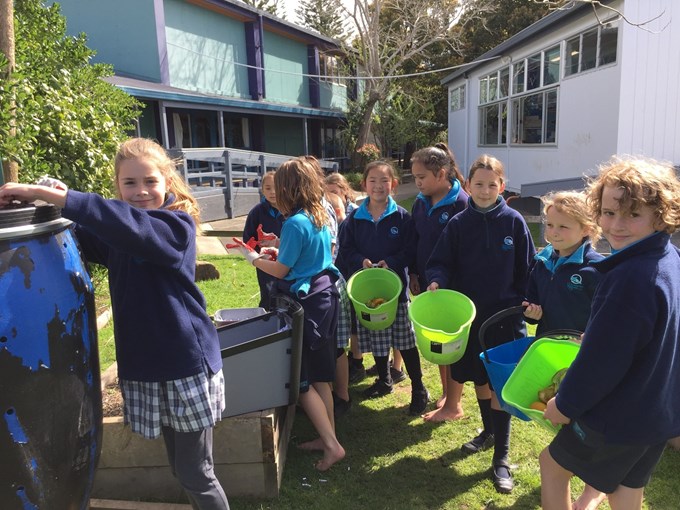Children at Whangaparaoa Primary School are learning that food scraps are riches, not rubbish, thanks to a grant from Auckland Council’s Waste Minimisation and Innovation Fund (WMIF).
The school applied to WMIF to help expand its existing compost system by introducing worm farms, enabling the school to increase its collection of organic waste.
“We needed something to boost our composting ability. The kids in our Green Team and student leaders were really keen on worm farms so when we saw the WMIF fund come up, we applied,” says teacher Debbie Thompson.
“We already do composting at school thanks to a council grant we received about 10 years ago to purchase compost bins. We need to increase our capacity with the bins filling up faster as the children have learned to use them more. The worm farms will help us manage all of our food scraps at the school.”
She says it’s great for the kids to be learning about minimising waste and to discover that food scraps are resources, not rubbish.
“So many of the children are keen on looking at how they can take care of the planet.
"Composting is a really good, practical way they can do something - watching food scrap resources being turned into nutrient-rich compost – and encourage others to do the same.
"In fact, the Green Team are so keen, they are indignant when anyone dares to put a piece of plastic in the compost bucket.”
The students run the Green Team themselves, including managing the composting roster. The buckets are emptied twice a week. Children from each classroom take their buckets to be emptied, cleaned and returned. Buckets are monitored and marked, if needed to prevent contamination.
“They’ve taken to monitoring and marking each bucket. Then, they’ll go and give classes a little talk on how to compost if their bucket is not so good and has lots of plastics and non-compostables inside. They have actually been noticing that often the teachers are the worst offenders. The staffroom bucket often gets pulled up and they’re working hard to educate the teachers.”
Debbie Thompson says it is great that Auckland Council provides this opportunity as it’s often really difficult for schools to budget for these types of initiatives.
“Many of the nice-to-haves are not usually a budgeted item. It’s a bonus to be able to access funds for long-term projects that benefit the kids and the planet. Funds like WMIF help us to broaden the scope of environmental education opportunities we are able to offer to children,” she says.
The worm farms will be the next step in an organic waste education journey for Whangaparaoa Primary students – helping them to learn all the different ways that food scraps can be kept out of landfill and used to help grow more great food.
Have you got a great zero-waste idea?
If you represent a business, local iwi, or an education or community group with a project that will help reduce the amount of waste sent to landfill, you could be eligible to apply.
Visit the Auckland Council website, email aucklandwastefund@aucklandcouncil.govt.nz, or call (09) 301 0101 to find out more.


